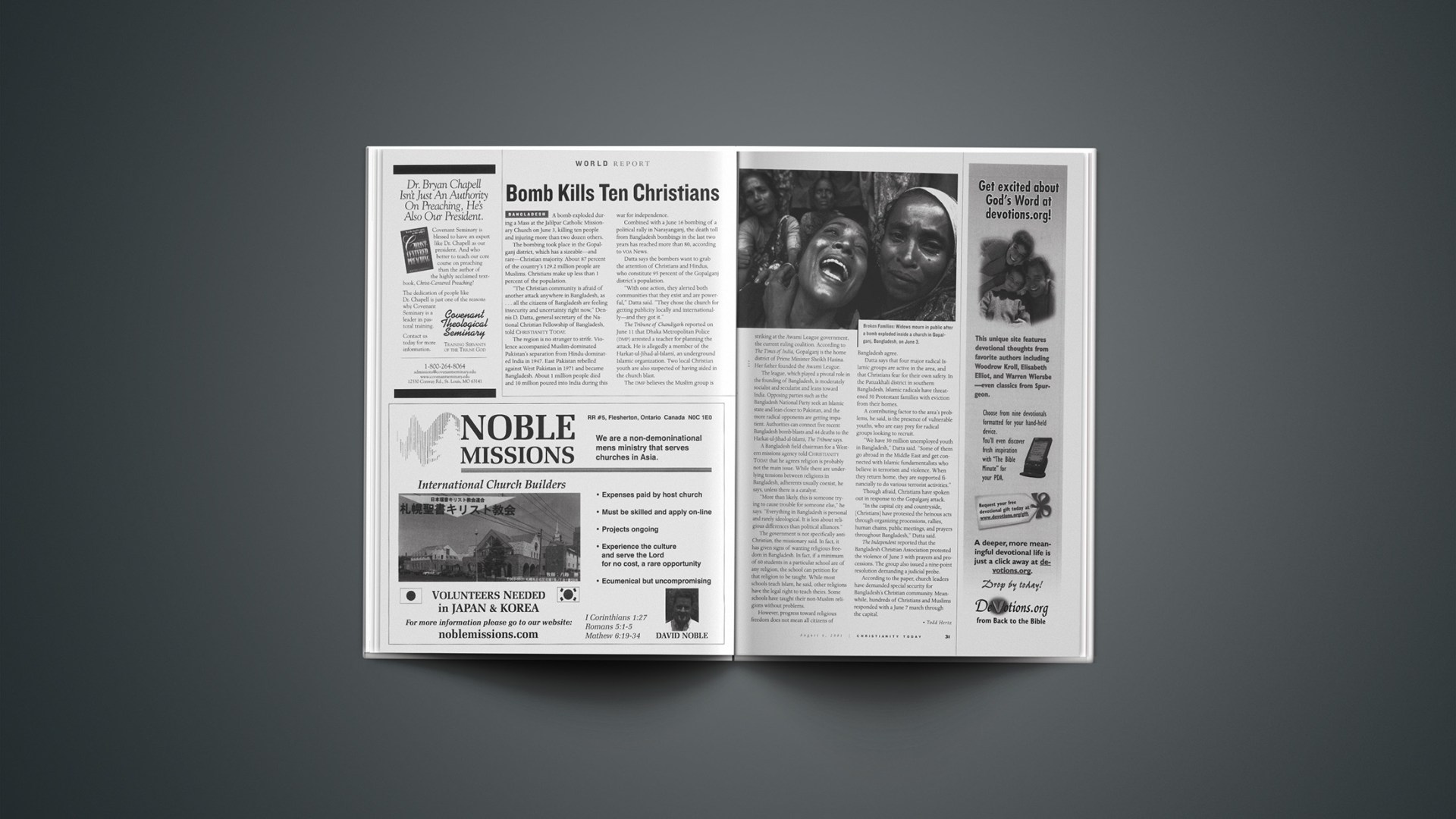A bomb exploded during a Mass at the Jalilpar Catholic Missionary Church on June 3, killing ten people and injuring more than two dozen others.
The bombing took place in the Gopalganj district, which has a sizeable—and rare—Christian majority. About 87 percent of the country's 129.2 million people are Muslims. Christians make up less than 1 percent of the population.
"The Christian community is afraid of another attack anywhere in Bangladesh, as. … all the citizens of Bangladesh are feeling insecurity and uncertainty right now," Dennis D. Datta, general secretary of the National Christian Fellowship of Bangladesh, told Christianity Today.
The region is no stranger to strife. Violence accompanied Muslim-dominated Pakistan's separation from Hindu-dominated India in 1947. East Pakistan rebelled against West Pakistan in 1971 and became Bangladesh. About 1 million people died and 10 million poured into India during this war for independence.
Combined with a June 16 bombing of a political rally in Narayanganj, the death toll from Bangladesh bombings in the last two years has reached more than 80, according to VOA News.
Datta says the bombers want to grab the attention of Christians and Hindus, who constitute 95 percent of the Gopalganj district's population.
"With one action, they alerted both communities that they exist and are powerful," Datta said. "They chose the church for getting publicity locally and internationally—and they got it."
The Tribune of Chandigarh reported on June 11 that Dhaka Metropolitan Police (DMP) arrested a teacher for planning the attack. He is allegedly a member of the Harkat-ul-Jihad-al-Islami, an underground Islamic organization. Two local Christian youth are also suspected of having aided in the church blast.
The DMP believes the Muslim group is striking at the Awami League government, the current ruling coalition. According to The Times of India, Gopalganj is the home district of Prime Minister Sheikh Hasina. Her father founded the Awami League.
The league, which played a pivotal role in the founding of Bangladesh, is moderately socialist and secularist and leans toward India. Opposing parties such as the Bangladesh National Party seek an Islamic state and lean closer to Pakistan, and the more radical opponents are getting impatient. Authorities can connect five recent Bangladesh bomb blasts and 44 deaths to the Harkat-ul-Jihad-al-Islami, The Tribune says.
A Bangladesh field chairman for a Western missions agency told Christianity Today that he agrees religion is probably not the main issue. While there are underlying tensions between religions in Bangladesh, adherents usually coexist, he says, unless there is a catalyst.
"More than likely, this is someone trying to cause trouble for someone else," he says. "Everything in Bangladesh is personal and rarely ideological. It is less about religious differences than political alliances."
The government is not specifically anti-Christian, the missionary said. In fact, it has given signs of wanting religious freedom in Bangladesh. In fact, if a minimum of 60 students in a particular school are of any religion, the school can petition for that religion to be taught. While most schools teach Islam, he said, other religions have the legal right to teach theirs. Some schools have taught their non-Muslim religions without problems.
However, progress toward religious freedom does not mean all citizens of Bangladesh agree.
Datta says that four major radical Islamic groups are active in the area, and that Christians fear for their own safety. In the Patuakhali district in southern Bangladesh, Islamic radicals have threatened 50 Protestant families with eviction from their homes.
A contributing factor to the area's problems, he said, is the presence of vulnerable youths, who are easy prey for radical groups looking to recruit.
"We have 30 million unemployed youth in Bangladesh," Datta said. "Some of them go abroad in the Middle East and get connected with Islamic fundamentalists who believe in terrorism and violence. When they return home, they are supported financially to do various terrorist activities."
Though afraid, Christians have spoken out in response to the Gopalganj attack.
"In the capital city and countryside, [Christians] have protested the heinous acts through organizing processions, rallies, human chains, public meetings, and prayers throughout Bangladesh," Datta said.
The Independent reported that the Bangladesh Christian Association protested the violence of June 3 with prayers and processions. The group also issued a nine-point resolution demanding a judicial probe.
According to the paper, church leaders have demanded special security for Bangladesh's Christian community. Meanwhile, hundreds of Christians and Muslims responded with a June 7 march through the capital.
Copyright © 2001 Christianity Today. Click for reprint information.










